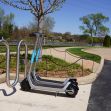Chad Defries went for a ride on the new Yamaha dirt bike that his wife bought him for Christmas. He was going over small hills on a course when the bike’s throttle slipped, the handlebars twisted, and he fell. He fractured a leg, separated his shoulder, and suffered other injuries. He sued the Japanese and American manufacturers, as well as the American distributor and dealer. The appellate court ruling, in favor of Defries, clarified the responsibilities of each party in the supply chain, as it reversed the trial court’s decision and ruled that Yamaha has a “nondelegable duty” to assure its bikes are assembled properly.
During the trial, the jury learned that Yamaha Japan does not fully assemble the bikes, but passes its partially assembled vehicles to distributors, who give them to dealers who complete the assembly. Plaintiff Defries sued all four companies in the chain for negligence, strict product liability (manufacturing defect), strict product liability (design defect), strict product liability (failure to warn), and breach of implied warranty.
At trial, the Superior Court of Riverside County found in favor of Yamaha. But in a 2-to-1 decision, the justices in Division Two of the Fourth District Court of Appeal reversed part of the trial court’s decision. Justice Michael J. Raphael wrote the majority opinion with a concurrence by Acting Presiding Justice Art W. McKinster. Justice Frank J. Menetrez authored a strong dissent.
The reversal was largely based on the court’s interpretation of Vandermark v. Ford Motor Company, which places “responsibility for defects, whether negligently or nonnegligently caused, on the manufacturer of the completed product . . .regardless of what part of the manufacturing process the manufacturer chooses to delegate to third parties.” Raphael explained that Yamaha could not “escape liability” if the defect that caused the accident was caused by “something one of its authorized dealers did or failed to do.”
During the trial, the jury learned that the dealer was responsible for attaching the throttle to the handlebar and the handlebar to the body of the bike. Langston Motorsports was the defendant that assembled and sold the bike to Defries. Plaintiff had settled with Langston before the trial, and both Yamaha Japan and Yamaha Manufacturing Corporation of America had been dismissed. Therefore, the only issues before the jury were whether Yamaha was liable for negligence, strict product liability (failure to warn) and breach of implied warranty.
Defries presented several expert witnesses who testified about Langston’s faulty assembly. Yamaha disputed the charges. The jury returned special verdicts and the trial court entered judgment for Yamaha and awarded Yamaha costs.
The appellate court’s discussion of the case begins with a clear statement that, “The jury should have been instructed that any negligence in assembly by Langston Motorsports should be imputed to Yamaha because of a nondelegable duty Yamaha had, and that judgment on this claim must therefore be reversed.” The trial court refused to give that instruction, saying it would be misleading and would lead the jury to a wrong conclusion.
Raphael then discussed why Defries’ proposed instruction on nondelegable duty was “proper.” His discussion included interpretations of Vandermark and an additional California Supreme Court case that held, “the manufacturer of a completed product subject to vicarious liability for the negligence of his suppliers or subcontractors that resulted in defects in the completed product.” He explained that manufacturers are subject to “vicarious liability” for the negligence of others who cause defects in completed products. Defries, the opinion said, was entitled to a jury instruction about Yamaha’s duty. The trial court should not have based its decision on other issues, including the strict liability claims that the plaintiff had withdrawn. The court wrote that the withdrawal did not preclude recovery based on Langston’s negligence.
The appellate court also said that although no evidence was presented to prove that Langston was an “agent” of Yamaha, precedent establishes that authorized dealers are clearly manufacturers’ agents rather than independent contractors.
Raphael then said that Defries’s motion for a new trial should have been granted because, reviewed in the light most favorable to the plaintiff, the trial court’s failure to give the requested instruction was prejudicial. But the remainder of the trial court’s rulings was not reversed. The trial court did not err when it granted four of Yamaha’s motions in limine. Among these are the proper exclusion of evidence about previous, similar dirt bike accidents, “experimental tests” performed by an expert, and an “opinion report” by another expert that was written shortly before trial.
The appellate opinion, therefore, reversed the judgment regarding the negligence cause of action and awarded costs to Defries. All other aspects of the trial court’s judgment were affirmed, and the opinion was certified for partial publication.
Justice Frank J. Menetrez concurred in part and dissented in part. He said that it “is not and never has been the law” that it is a tort if one sells a non-defective product. He wrote that the cited Supreme Court case was never “interpreted the way the majority interpreted it, and explained that this was “unsurprising because Vandermark “has nothing to do with holding a distributor liable for a dealer’s negligence.” He said that such a finding “would have been a bombshell” and that reactions to it would have been “swift, shrill and numerous for the remarkable proposition that selling a nondefective product can be a tort.” He argued that he was correct because “there was no such reaction.”






